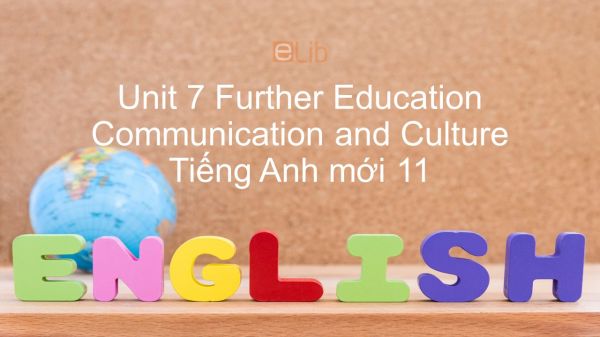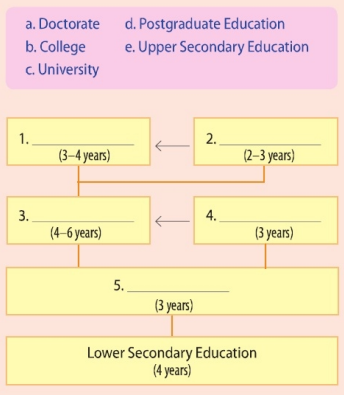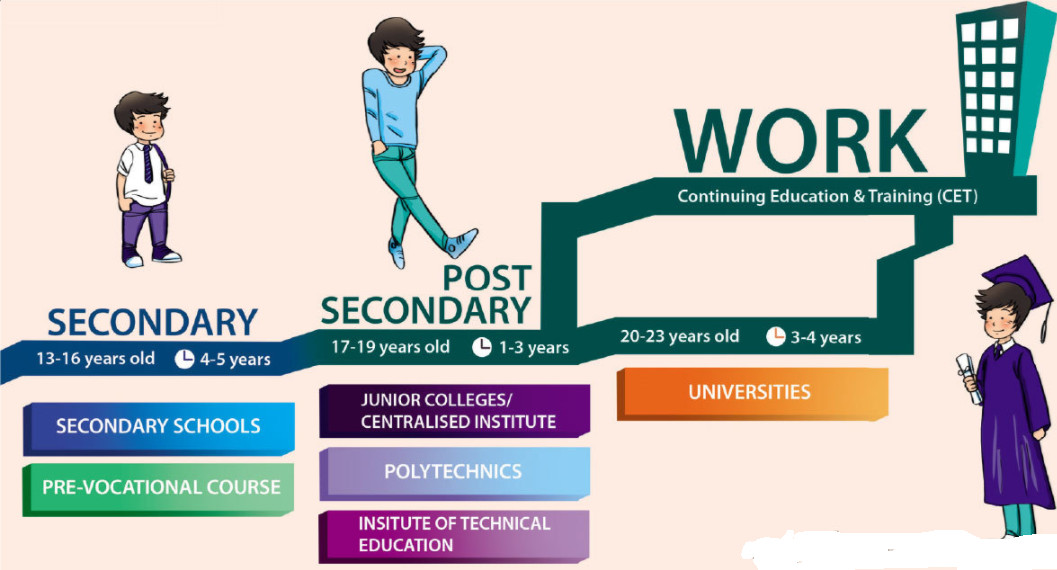Unit 7 lớp 11: Further Education - Communication and Culture
Bài học Unit 7 Lớp 11 mới phần Communication and Culture giới thiệu cho các em hệ thống giáo dục ở Việt Nam và thông tin về giáo dục bổ túc ở Singapore. Thông qua các dạng bài tập khác nhau, các em hiểu được chương trình giáo dục ở nước ta và nước bạn. Mời các em cùng tham khảo!
Mục lục nội dung

1. Communication
Higher education in Vietnam (Giáo dục đại học tại Việt Nam)
1.1. Task 1 Unit 7 lớp 11
Work in groups of three. Label the diagram of Vietnam’s education system after primary school, using the words in the box. (Làm bài tập theo nhóm ba học sinh. Điền vào ô trống trong sơ đồ giản lược về hệ thống giáo dục Việt Nam sau bậc tiểu học. Sử dụng các từ cho sẵn trong khung.)

Guide to answer
1. a – Doctorate (Tiến sĩ)
2. d – Postgraduate Education (Giáo dục sau đại học)
3. c – University (Đại học)
4. b – College (Cao đẳng)
5. e – Upper Secondary Education (Giáo dục trung học phổ thông)
1.2. Task 2 Unit 7 lớp 11
Listen to an overview on Viet Nam's higher education. Decide if the folltwim statements are true (T) or false (F). Tick the correct boxes. (Hãy nghe một bài giới thiệu khái quát về giáo dục đại học tại Việt Nam. Quyết định những câu dưới đây đúng (T) hay sai (F). Đánh dấu vào các ô đúng.)
Click to listen
Guide to answer
1 – F. Most Vietnamese families want their children to take vocational courses.
(Hầu hết các gia đình Việt Nam đều muốn con mình học nghề.)
2 – F. Viet Nam has only developed its vocational education system recently.
( Việt Nam gần đây chỉ phát triển hệ thống giáo dục hướng nghiệp)
3 – T. It often takes three years to graduate from a college.
(Thường mất ba năm để tốt nghiệp từ một trường cao đẳng.)
4 – F. Students often have to pass three examinations before they can enter university.
(Sinh viên thường phải vượt qua ba kỳ thi trước khi vào đại học.)
5 – F. Students can only use their personal funds to pay for their studies abroad.
(Sinh viên chỉ có thể sử dụng nguồn quỹ cá nhân để trả học phí ở nước ngoài.)
Audio Script:
Education plays an important role in Vietnamese culture and societyễ Most parents ii Viet Nam want their children to go to university or college, which will open doors to a brighter future.
In recent years, Viet Nam has focused on developing its education system, especialh higher education and vocational schools.
According to the current education system, higher education is defined as learnim beyond secondary level.
In order to be eligible for higher education, students must have certificates of secondar school graduation and may be required to take the entrance examination with various sets of subjects depending on different majors.
At colleges, programmes often last three years. After graduating, students receivc associate's degrees and may continue their studies for one or two years to get bachelors degrees. After completing these courses, students may pursue programmes for master : and doctoral degrees.
Overseas education has become increasingly popular as young people believe that the-- will have more oportunities for developing their talents and better employment prospects Students usually finance their studies abroad through scholarships or personal savines.
Tạm dịch
Giáo dục đóng một vai trò quan trọng trong nền văn hoá và xã hội Việt Nam. Hầu hết các bậc cha mẹ Việt Nam muốn con mình đi học đại học, sẽ mở ra một tương lai tươi sáng hơn.
Trong những năm gần đây, Việt Nam đã tập trung phát triển hệ thống giáo dục, đặc biệt là giáo dục đại học và dạy nghề.
Theo hệ thống giáo dục hiện nay, giáo dục đại học được định nghĩa là học vượt khỏi trình độ trung học.
Để đủ điều kiện nhận học bổng cao hơn, sinh viên phải có giấy chứng nhận tốt nghiệp trung học cơ sở và có thể phải thi đầu vào với nhiều loại môn khác nhau tùy thuộc vào các chuyên ngành khác nhau.
Ở các trường cao đẳng, các chương trình thường kéo dài ba năm. Sau khi tốt nghiệp, sinh viên nhận được bằng liên kết và có thể tiếp tục học trong một hoặc hai năm để lấy bằng cử nhân. Sau khi hoàn thành các khóa học này, sinh viên có thể theo đuổi các chương trình thạc sĩ và bằng tiến sĩ.
Giáo dục ở nước ngoài ngày càng trở nên phổ biến khi thanh thiếu niên tin rằng - sẽ có nhiều cơ hội để phát triển tài năng và triển vọng việc làm tốt hơn . Sinh viên thường chi trả cho việc học tập ở nước ngoài thông qua học bổng hoặc các cá nhân.
1.3. Task 3 Unit 7 lớp 11
Discuss in groups. Give your opinion about higher education and suggest what should be done to help students to pursue academic or professional degrees. (Thảo luận theo nhóm. Hãy cho biết ý kiến của em về giáo dục đại học và đề xuất các cách giúp học sinh theo đuổi con đường học vấn hoặc bằng cấp chuyên ngành.)
Guide to answer
I think we should go to university for the following reasons:
- University will give you the oportunity to expand your potential by giving vou more tools for success
- University graduates can get better jobs and earn more money.
- University will give you the oportunity to interact with people that can challenge your thinking, people of diverse background and cultures.
The ways to help students to pursue a higher education degree
- Helping them realize the benefits and prospects of higher education
- Providing them with comprehensive information on hiaher education (for example, information in detail about college/university quality, education costs...). When students have better information, they make better choices about their education.
Tạm dịch:
Tôi nghĩ chúng ta nên học đại học vì những lý do sau:
- Đại học sẽ cung cấp cho bạn cơ hội để mở rộng tiềm năng của bạn bằng cách tạo nhiều công cụ để thành công
- Sinh viên tốt nghiệp đại học có thể có được việc làm tốt hơn và kiếm được nhiều tiền hơn.
- Đại học sẽ cung cấp cho bạn cơ hội để tương tác với những người có thể thách thức suy nghĩ của bạn, những người có nền văn hoá đa dạng và khác nhau.
Các cách để giúp học sinh theo một nền giáo dục đại học
- Giúp họ nhận ra lợi ích và triển vọng của giáo dục đại học
- Cung cấp cho họ thông tin toàn diện về giáo dục hằng năm (ví dụ, thông tin chi tiết về chất lượng đại học / trường đại học, chi phí giáo dục ...). Khi sinh viên có thông tin tốt hơn, họ sẽ có những lựa chọn tốt hơn về giáo dục của mình.
2. Culture
Further education in Singapore (Giáo dục bổ túc ở Singapore)
2.1. Task 1 Unit 7 lớp 11
Look at the Singapore’s education journey. Work with a partner. Briefly describe the stages following secondary education. (Hãy xem sơ đồ mô tả hệ thông giáo dục Singapore. Thảo luận với bạn bên cạnh. Mô tả ngắn gọn các giai đoạn tiếp theo sau giáo dục trung học ở Singapore.)

Guide to answer
After graduating from high school, students can attend pre-university courses at junior colleges or the Centralised Institute. It last 1 - 3 years. They can also go to Polytechnics which prepare them both for the workforce and university studies.
Tạm dịch:
Sau khi tốt nghiệp trung học, học sinh có thể tham dự các khóa học dự bị đại học tại các trường trung học cơ sở hoặc tại Học viện Tập trung. Kéo dài từ 1 đến 3 năm. Họ cũng có thể đến Polytechnics nơi để chuẩn bị cho cả hai lực lượng lao động và sinh viên đại học.
2.2. Task 2 Unit 7 lớp 11
Read the text and answer the questions. (Đọc bài khóa và trả lời câu hỏi.)
Singapore's secondary and further education
One of the main aims of the Singapore’s education system is to help students to discover their talents and develop a passion for learning.
During secondary education, which lasts four to five years, students have opportunities to take various courses, build their strengths and develop their talents in both academic and non-academic areas. For example, after passing standardised examinations, students can enrol on courses in specialised independent schools such as NUS High School of Mathematics and Science, Singapore Sports School, School of the Arts, or School of Science and Technology. They can further their study and interests at junior colleges and polytechnics through direct admission. These are flexible ways that allow students to continue their education journey at a post-secondary institution.
After leaving secondary school, students can pursue either pre-university education or technical education. A pre- university course provides students with essential skills and knowledge for higher education. They can realise their potential through a wide range of subjects from academic areas such as Humanities, Arts, Languages, Mathematics, and Science. Alternatively, technical education, through collaboration with companies and other organisations, can equip students with professional, technical skills and working experience. They can select engineering, technical, business or service skills areas to prepare themselves for their work environment.
If they want to pursue higher education, students can do that at one of the four publicly-funded local universities with degree programmes. All of them have giobal partnerships with leading universities and educational institutions overseas to ensure the best quality and future for the graduates.
1. Name one of the important targets of Singapore's education.
(Kể tên một trong những mục tiêu quan trọng của nền giáo dục Singapore.)
2. What is the requirement for enrolling on special courses in secondary eduation?
(Yêu cầu khi đăng ký học các khóa học đặc biệt trong giáo dục trung học là gì?)
3. How can secondary education prepare students for further education?
(Làm thế nào để giáo dục trung học chuẩn bị cho sinh viên học cao hơn?)
4. What are the choices for secondary school leavers?
(Các lựa chọn cho học sinh trung học ra trường là gì?)
5. How many local institutions provide higher education in Singapore?
(Có bao nhiêu tổ chức địa phương cung cấp giáo dục nâng cao học ở Singapore?)
Guide to answer
1. To help students to discover their talents and develop a passion for learning.
(Giúp học sinh khám phá tài năng của mình và phát triển niềm đam mê học tập.)
2. They have to pass standardized examinations.
(Học sinh phải vượt qua các kỳ thi tiêu chuẩn.)
3. It builds up students strengths and develops their talents in both academic and non- academic areas.
(Xây dựng thế mạnh của sinh viên và phát triển tài năng của họ trong cả hai lĩnh vực học thuật và phi học thuật.)
4. They can select pre-university education or technical education.
(Họ có thể chọn giáo dục đại học hoặc giáo dục kỹ thuật.)
5. There are four local universities with degree programmes for higher education.
(Có bốn trường đại học địa phương với các chương trình học cao học.)
Tạm dịch:
Giáo dục trung học và giáo dục bổ túc ở Singapore
Một trong những mục tiêu chính của hệ thống giáo dục Singapore là giúp học sinh phát hiện tài năng và phát triển niềm đam mê học hỏi.
Suốt thời gian theo học cấp 2, kéo dài từ 4 đến 5 năm, học sinh có cơ hội tham gia những khóa học khác nhau, tạo dựng thế mạnh cũng như phát triển tài năng của mình ở cả hai lĩnh vực học thuật và không học thuật. Ví dụ, sau khi đạt điểm trong các kỳ thi chuẩn, học sinh có thể đăng ký những khóa học tại các trường chuyên độc lập như trường Trung học Phổ thông Chuyên Toán và Khoa Học (NUS), trường Thể Thao Singapore, trường Nghệ Thuật, trường Khoa Học và Công Nghệ. Họ có thể tiếp tục theo học các môn yêu thích tại trường cao đẳng và bách khoa thông qua đăng ký trực tiếp. Đây là những cách làm linh động cho phép học sinh tiếp tục con đường học vấn của mình tại một trường công lập sau trung học.
Sau khi rời trường trung học, học sinh có thể theo học hoặc dự bị đại học hoặc giáo dục kỹ thuật. Một khóa dự bị đại học chuấn bị cho học sinh những kỹ năng và kiến thức cần thiết cho giáo dục đại học. Họ có thể nhận thức rõ tiềm năng của mình thông qua rất nhiều môn học từ lĩnh vực học thuật như Khoa học Nhân văn, Nghệ thuật, Ngôn ngữ, Toán học và Khoa học. Ngoài ra, giáo dục kỹ thuật, cùng với các công ty và các tổ chức khác, có thể trang bị cho học sinh những kỹ năng, kỹ thuật chuyên ngành và kinh nghiệm làm việc. Họ có thể lựa chọn các lĩnh vực kỹ năng khác nhau như kỹ nghệ, kỹ thuật, kinh doanh hoặc dịch vụ để làm quen với môi trường làm việc trong tương lai.
Nếu học sinh muốn theo đuổi giáo dục đại học, họ có thể thực hiện ước mơ của mình tại một trong bốn trường công lập địa phương theo các chương trình học được cấp bằng. Tất cả bốn trường này đều có cộng tác toàn cầu với những trường đại học hoặc viện giáo dục hàng đầu trên thế giới để đảm bảo chất lượng tốt nhất và tương lai cho sinh viên tốt nghiệp.
3. Practice Task 1
Mark the letter A, B, C, or D to indicate the sentence that is closest in meaning to each of the following questions.
Question 1. It's only her second time in an international conference about further education.
A. It was the second time she had been in an international conference about further education.
B. She has only been in an international conference about further education once before.
C. She has never been to any international conference about further education before.
D. She has already got used to being in an international conference about further education.
Question 2. I started writing this essay hours ago and it's still not right.
A. I have been writing this essay for hours and it's still not right.
B. It's hours ago since I last wrote this essay correctly.
C. The last time I started writing this essay was hours ago, which is still not right.
D. I didn't stop to write this essay hours ago and it's still not right.
Question 3. “You'd better work harder if you don't want to retake the exam!” the teacher said to Jimmy.
A. The teacher advised Jimmy to work harder if he didn't want to retake the exam.
B. The teacher ordered Jimmy to work harder if he didn't want to retake the exam.
C. The teacher reminded Jimmy to work harder if he didn't want to retake the exam.
D. The teacher warned Jimmy to work harder if he didn't want to retake the exam.
Question 4. Lisa has never studied abroad before.
A. It's the first time Lisa has ever studied abroad.
B. It's the last time since Lisa studied abroad.
C. It was the first time Lisa had ever studied abroad.
D. Never before Lisa has studied abroad.
4. Practice Task 2
Mark the letter A, B, C, or D to indicate the correct answer to each of the following questions.
Question 1: I ____ the latest Harry Potter book all day. I'm dying to know what happens in the end!
A. am reading B. have been reading C. have read D. had read
Question 2: So far I ____ any of the exams at school.
A. haven't been failing B. hadn't failed C. didn't fail D. haven't failed
Question 3: We ____ our classroom for the upcoming Teachers' Day, but there's still a lot to do.
A. are decorating B. decorated C. have been decorating D. have decorated
Question 4: Margaret ____ in the school marathon for charity before.
A. has never run B. never runs C. never ran D. has never been running
Để ôn tập các từ vựng và các điểm ngữ pháp giúp phát triển kĩ năng giao tiếp, mời các em đến với phần trắc nghiệm Unit 7 Communication and Culture Tiếng anh 11 mới sau đây và cùng luyện tập.
6. Conclusion
Kết thúc bài học Unit 7 Tiếng Anh lớp 11 mới – Communication and Culture, các em học sinh cần nắm được hệ thống giáo dục ở nước ta và đưa ra đề xuất để giúp học sinh theo đuổi con đường đại học; đồng thời tìm hiểu thông tin về giáo dục bổ túc ở Singapore để biết được chương trình giáo dục của một nước tiên tiến.
Tham khảo thêm
- doc Unit 7 lớp 11: Further Education - Getting Started
- doc Unit 7 lớp 11: Further Education - Language
- doc Unit 7 lớp 11: Further Education - Reading
- doc Unit 7 lớp 11: Further Education - Speaking
- doc Unit 7 lớp 11: Further Education - Listening
- doc Unit 7 lớp 11: Further Education - Writing
- doc Unit 7 lớp 11: Further Education - Looking Back
- doc Unit 7 lớp 11: Further Education - Project



